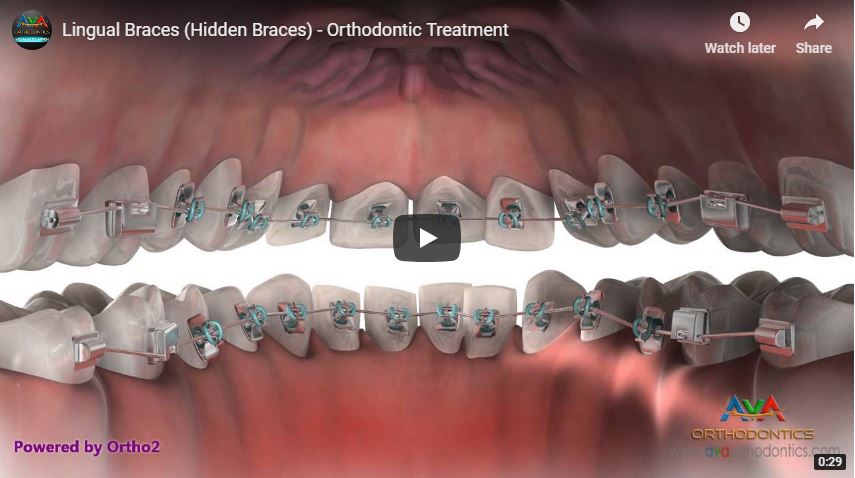Lingual Braces are a form of orthodontics we can offer you that are capable of manoeuvring teeth into a pre-determined position. This is a brilliant opportunity for those who want or need to achieve straighter teeth. Our Lingual Braces consist of a combination of wire and brackets. It is a form of treatment that harnesses delicate yet constant pressure to move your teeth.
Ideal for those who would prefer their braces to not be visible to others, Lingual Braces are positioned behind the teeth and are thus hidden from sight. Our Lingual Braces are discrete, effective and sure to give you straighter teeth for a full smile.

Your Treatment Process
The whole process for our Lingual Braces treatment will begin with one of our exceptionally skilled dentists taking an impression of your teeth. The reason that we do this is to help us create the wires and brackets that are vital components in Lingual Braces. The impression of the patient's teeth ensure that the wires and brackets are bespoke, meaning that they are perfectly suited to your teeth and mouth. In order to produce these wires and brackets specifically for you, a period of up to 6 weeks could be necessary. Once we have finished making the bespoke brackets and they are ready to use in the next stage of the treatment, they are then affixed to the back of the patient's teeth. We will also attach the wire for you at this stage, too. The length of the entire process in which we install your Lingual Braces will vary; the minimum amount of time needed will be a period of 18 months and the maximum will be 36 months.
Over the course of the Lingual Braces treatment process, the dentist will see you at regular intervals. The purpose of this is to allow your dentist to take the time to assess the progress of the treatment and to make any necessary adjustments that may be required.
Your Post-Treatment Experience
After you have reached the end of your Lingual Braces treatment, it is possible that you may discover a certain swelling or irritation in your tongue. This is a result of the Lingual Braces being positioned behind your teeth. If you experience this, you should not be concerned as it can be alleviated relatively easily by simply applying wax on the inside of your teeth and over the braces. Following your Lingual Braces treatment, it is also possible that you could experience some limitation to your ability to speak. This is something that you would only really experience for a brief period of time once the treatment is complete, and should resolve itself after you have become accustomed to having the Lingual Braces in your mouth.
Aftercare
The next step for our patients after their Lingual Braces treatment is finished is to do the right kind of things at home to take care of their teeth and braces.
The first thing that we advise our patients to do is to make sure that they brush their teeth at least twice every day and ideally after every meal, rinsing the mouth with water both before and after brushing commences. Brushing should be thorough, paying particular attention to any food pieces that may have collected in the braces. Bear in mind as well that you should try to brush above and below the brackets and up to the gum line. Also aim to clean the brackets by pointing the head of the toothbrush down from above, and then pointing up at the brackets from below. Brushing should be done for two minutes each time, and with a soft-bristled brush, or, if you prefer, an electric toothbrush.
Another thing for you to do after undergoing our Lingual Braces treatment is to floss your teeth a minimum of once a day. You should ensure that you floss between the braces as well as under the wires. Alternatively, you may want to utilise an interdental brush. Furthermore, you will need to use a fluoride mouthwash. Making use of this mouthwash to rinse your mouth out will dislodge any debris from food and will help strengthen your teeth at the same time.
An additional factor relevant to caring for your teeth and braces is careful eating. This involves an avoidance of eating excessive amounts of sugary and starchy foods as well as chewy and sticky foods. Be aware that hard food such as nuts are not to be eaten at all and that apples and carrots need to be eaten with caution. However, foods that are crunchy do not have to be removed from your diet completely, but should probably be sliced into small pieces first.
Finance Options
We are now offering finance on all treatments. Find out more about our finance options.
FAQs
Have more questions about our services or orthodontic treatment? Read our frequently asked questions.
Why Choose a Specialist Orthodontist?
Specialist orthodontists are dentists who have more training and experience providing orthodontic treatments such as Invisalign. Patients that receive orthodontics from a specialist find that their treatment is of higher quality, they finish treatment much sooner, and the level of care they receive is much higher.
Due to advances in aligner technology, we no longer offer fixed braces as a treatment option. Our specialists have found that removable aligners such as Invisalign are more likely to result in successful treatment, and are safer for the patient compared to traditional braces. Even if you have been told that fixed are your only option by other practitioners; our specialists are confident we will be able to treat your orthodontic problems using this modern treatment.
Book a Consultation
Do you wish you had straighter teeth? If so, send a WhatsApp message by clicking here or complete the contact form below to arrange a free online consultation with our orthodontist and learn more about what we can do for you.


